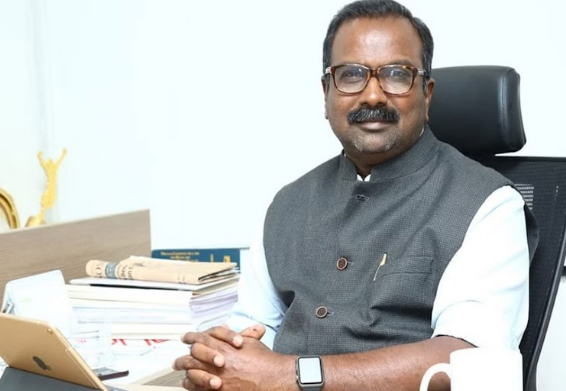“Indian pharma firms must remain updated and adapt to changing requirements continually”
October 31, 2023 | Tuesday | Views | By Amguth Raju
The Indian Pharmaceutical Industry is celebrating an unprecedented milestone, with exports reaching a staggering $25.3 billion by the end of the first quarter of the 2023 fiscal year. This remarkable achievement, reflecting over 100 per cent growth in the past decade since 2013-14, has been made possible through the collaborative efforts of the industry, the Pharmaceuticals Export Promotion Council of India (Pharmexcil), and the government. Together, they have not only fortified India's pharmaceutical foundation but also paved the way for expanding into new global markets. We had the privilege of sitting down with Ravi Uday Bhasker, Director General of Pharmexcil, to gain insights into this extraordinary journey.
How do you perceive India's pharmaceutical and biotechnology growth over the past decade, and what role has Pharmexcil played in propelling India's exports?
The growth we witness today is the culmination of over three decades of dedicated efforts by all stakeholders. India's adoption of an open economy policy in the 1990s unleashed the potential for private enterprises with innovative ideas and attracted substantial global investments into the pharmaceutical and biotechnology sectors. Transitioning from a country dependent on healthcare imports, India has not only achieved self-sufficiency but also emerged as a key player supplying high-quality medicines to over 200 countries globally. This extraordinary journey saw India's pharmaceutical exports increase from a meager $3.9 billion in 2004-05 to over $25.3 billion in 2023, reflecting consistent growth of more than 100 per cent each decade.
Pharmexcil, established in 2004 with its headquarters in Hyderabad, has played a pivotal role in promoting and catalysing India's pharmaceutical exports. The council identifies industry challenges related to generic exports, collaborates with stakeholders, and advocates for solutions with the Indian government and international agencies. Through seminars, interactive meetings, conferences, and buyer-seller gatherings, Pharmexcil enhances networking among export partners. Furthermore, the council advises the central government on policy matters concerning pharmaceutical exports and assists member companies in claiming Market Access incentives (MAI) refunds. Pharmexcil has also facilitated Indian pharmaceutical and biotechnology trade delegations abroad and hosted international delegates to acquaint them with the domestic industry.
Despite remarkable export growth, India's pharmaceutical sector faces challenges. What are the major challenges, and how can they be overcome?
Undoubtedly, India is a global leader in producing high-quality generic medicines at affordable prices, earning the moniker "Pharmacy of the World." Nevertheless, the industry grapples with challenges such as evolving international safety and standard regulations and fierce competition from other generic manufacturers. To address these challenges, Indian pharmaceutical firms must remain updated and adapt to changing requirements continually.
Both state and central governments should encourage the industry to embrace new and advanced technologies by offering incentives and support. Continuous innovation and adherence to global quality and safety standards will be key to maintaining India's growth in pharmaceutical exports.
How did the COVID-19 pandemic impact the Indian pharmaceutical sector?
While the COVID-19 pandemic disrupted global businesses, India's pharmaceutical industry, especially the vaccine sector, experienced a resurgence. Despite supply chain disruptions, pharmaceutical exports grew significantly from $15.4 billion in FY15 to $24.6 billion in FY22. During April to December 2022, exports reached $18.8 billion, showcasing a positive growth of 3.6 per cent over the same period.
The pandemic saw the development of indigenous vaccines in India, such as Bharat Biotech's Covaxin and Zydus Cadila's Zycov-D. India is also developing its first indigenous mRNA vaccine, HGC019, in collaboration with HDT Biotech Corporation, US. Global manufacturers, including Serum Institute of India, Moderna, Gamaleya, and Janssen, received COVID-19 vaccine approvals in India. India is a major global exporter of vaccines, with approximately 60 per cent of the market share, making it a significant player in the global COVID-19 vaccine distribution.
Could you elaborate on the recent issue of substandard cough syrup in Africa and its impact on India's exports?
The unfortunate incident of substandard cough syrup causing the deaths of children in Gambia, Africa, has indeed tarnished the image of the Indian pharmaceutical industry. The World Health Organization also raised concerns after identifying discrepancies in the cough syrup product, leading many countries to express apprehensions about the quality control standards of certain pharmaceutical companies.
The Indian government has taken this issue seriously and promptly shut down the identified units, with stringent legal actions to be taken based on the investigation report. It's important to note that this incident does not negate India's capacity to produce high-quality, affordable generics. Over 50 per cent of India's exports are directed toward the highly regulated markets of the USA and the EU, with more than 703 registered manufacturing sites holding USFDA approval, constituting nearly 20 per cent of the total such sites worldwide.
What are the key strengths of the Indian pharmaceutical industry, and how does India contribute to global healthcare?
India's major strength lies in its ability to produce high-quality generic medicines at affordable prices. The presence of highly skilled human resources has propelled India to become the largest exclusive generic exporter globally. The success story of providing affordable HIV treatment from India is an exemplary achievement, reinforcing India's reputation as the "Pharmacy of the World."
From a global perspective, India is a pivotal player in the pharmaceutical and healthcare sectors. While the global market grew by just 1 per cent in 2022, India's pharmaceutical exports increased by 3.25 per cent to reach $25.3 billion. This highlights India's status as the fastest-growing pharmaceutical hub worldwide.
In conclusion, India's pharmaceutical industry has achieved remarkable export growth, bolstered by the collective efforts of industry stakeholders, government support, and the contributions of Pharmexcil. Despite challenges, India continues to excel in the global pharmaceutical arena, setting new standards in quality, affordability, and innovation. As the "Pharmacy of the World," India plays a crucial role in global healthcare and pharmaceutical trade.
Amguth Raju









